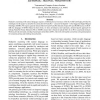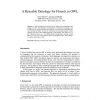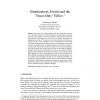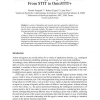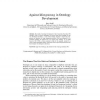FOIS
2006
15 years 3 months ago
2006
The term `behavior' is used ubiquitously in engineering. It refers roughly to the way technical artifacts `behave' in a given or hypothetical situation, and plays a pivot...
FOIS
2006
15 years 3 months ago
2006
Deductive reasoning with natural language requires combining lexical resources with the world knowledge provided by ontologies. In this paper we describe the connection of FrameNe...
120
click to vote
FOIS
2006
15 years 3 months ago
2006
A critical problem for practical KR is dealing with relationships that change over time. This problem is compounded by representation languages such as OWL that are biased towards ...
123
click to vote
FOIS
2006
15 years 3 months ago
2006
Natural languages are easy to learn by infants, they can express any thought that any adult might ever conceive, and they accommodate the limitations of human breathing rates and s...
FOIS
2006
15 years 3 months ago
2006
Abstract. Some events recur, and some happen only once. Galton refers to the latter as "once-only" events [1]. In a first-order logic of events that makes a type-token di...
106
click to vote
FOIS
2006
15 years 3 months ago
2006
Abstract. A variety of disciplines and research areas have separately studied the notions of action, agents and agency, but no integrated and well-developed formal ontology for the...
137
click to vote
FOIS
2006
15 years 3 months ago
2006
Abstract. Across a wide range of domains, there is an urgent need for a wellfounded approach to incorporating uncertain and incomplete knowledge into formal domain ontologies. Alth...
103
click to vote
FOIS
2006
15 years 3 months ago
2006
We present a theory of granular parthood based on qualitative cardinality and size measures. Using standard mereological relations and qualitative, contextdependent relations such ...
133
click to vote
FOIS
2006
15 years 3 months ago
2006
The world of ontology development is full of mysteries. Recently, ISO Standard 15926 ("Lifecycle Integration of Process Plant Data Including Oil and Gas Production Facilities&...
109
click to vote
FOIS
2006
15 years 3 months ago
2006
The field of BioInformatics has become a major venue for the development and application of computational ontologies. Ranging from controlled vocabularies to annotation of experim...

